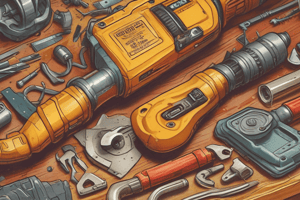Podcast
Questions and Answers
What is one of the most common injuries associated with power tools?
What is one of the most common injuries associated with power tools?
- Dislocations
- Sprains
- Bruises
- Fractures (correct)
How can many of the injuries from power tools be prevented?
How can many of the injuries from power tools be prevented?
- By using power tools only during the day
- By wearing a helmet
- By having a first aid kit nearby
- By wearing the appropriate safety gear and following safety procedures (correct)
What should you do if you suffer an injury from a power tool?
What should you do if you suffer an injury from a power tool?
- Wait for a few days to see if it heals on its own
- Share it on social media
- Ignore it and continue working
- Seek medical attention as soon as possible (correct)
Why is it crucial to read the operator's manual before using a power tool?
Why is it crucial to read the operator's manual before using a power tool?
What type of personal protective equipment (PPE) might be necessary when using power tools?
What type of personal protective equipment (PPE) might be necessary when using power tools?
What is the greatest hazard posed by hand tools?
What is the greatest hazard posed by hand tools?
Why should you unplug any power tools that are not in use?
Why should you unplug any power tools that are not in use?
Which characteristic makes power tools more suitable for larger projects?
Which characteristic makes power tools more suitable for larger projects?
How can keeping your work area clean and well-ventilated help prevent accidents?
How can keeping your work area clean and well-ventilated help prevent accidents?
Why is securing your workpiece important when using handheld power tools?
Why is securing your workpiece important when using handheld power tools?
Flashcards are hidden until you start studying
Study Notes
Power Tools Safety
Power tools can be incredibly useful for a wide range of tasks, but they can also pose significant risks to users if not used properly. In this article, we'll discuss the safety precautions and tips for using power tools effectively and safely.
Common Injuries and Hazards
Some of the most common injuries associated with power tools include:
In more severe cases, power tools can lead to injuries such as:
Many of these injuries can be prevented by using the proper safety gear and following proper safety procedures. However, even with the best precautions, accidents can still happen. If you suffer an injury from a power tool, it's essential to seek medical attention as soon as possible.
Safety Tips for Using Power Tools
When using power tools, it's crucial to follow these safety tips to minimize the risk of injury:
- Read the operator's manual: Before using any power tool, read the manufacturer's instructions carefully to understand its operation and safety features.
- Wear appropriate PPE: Depending on the tool and task, you may need to wear gloves, eye protection, hearing protection, or other types of personal protective equipment (PPE).
- Secure your workpiece: Use clamps or another type of stability device to secure your workpiece when using handheld power tools.
- Avoid loose clothing or jewelry: Loose clothing or jewelry can get caught in moving parts, posing a risk of injury.
- Keep your work area clean and well-ventilated: A clean, well-ventilated work area helps prevent accidents and reduces exposure to fumes and dust particles.
- Unplug and disconnect power tools: Always unplug any power tools that are not in use and ensure the work area is dry and clean when using electrical tools.
- Check for loose screws or equipment: Inspect tools for loose screws or equipment that may cause accidents and electrocution.
By following these safety tips, you can help minimize the risk of injury when using power tools.
Power Tools vs. Hand Tools: Key Differences
Power tools are mechanical or electrical devices powered by a motor or battery, typically faster and more powerful than hand tools. They are ideal for larger projects but can be more difficult to control and more expensive. In contrast, hand tools are non-powered and include everything from axes to wrenches. The greatest hazards posed by hand tools result from misuse and improper maintenance.
Conclusion
Power tools can be incredibly useful in various applications, but they also come with risks. By following the safety tips and precautions outlined in this article, you can minimize the risk of injury and use power tools effectively. Remember, always read the operator's manual, wear appropriate PPE, secure your workpiece, and keep your work area clean and well-ventilated.
Studying That Suits You
Use AI to generate personalized quizzes and flashcards to suit your learning preferences.




